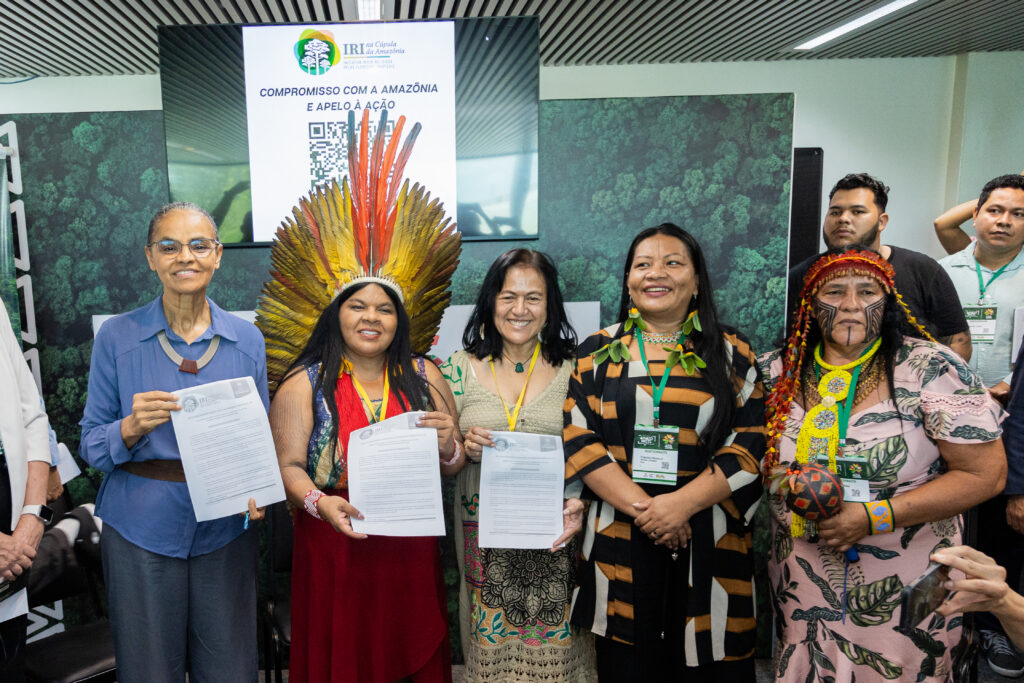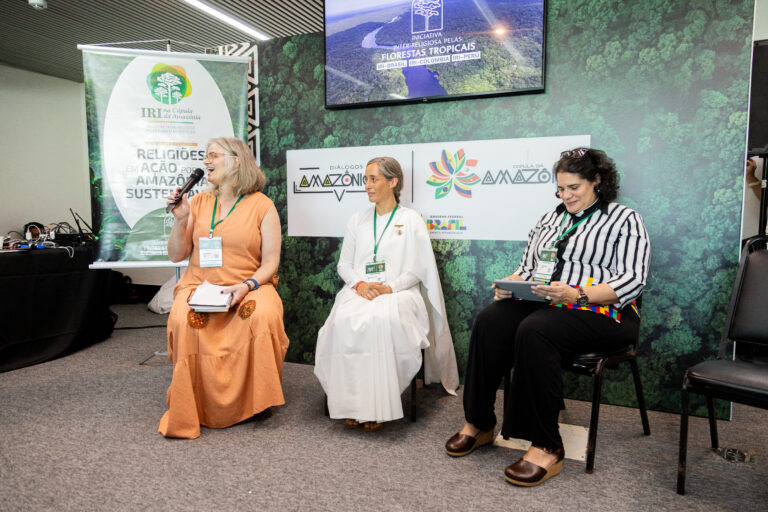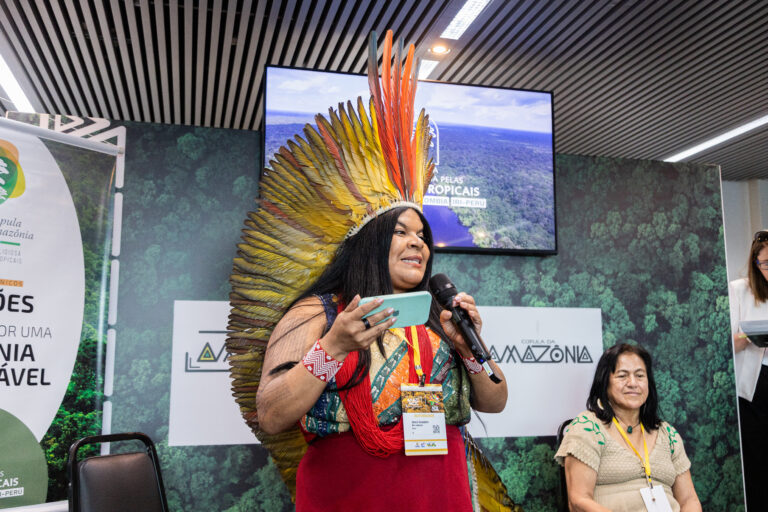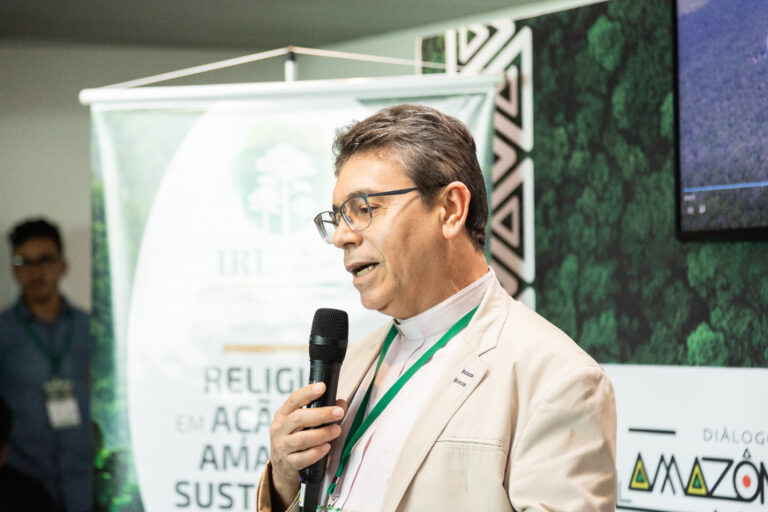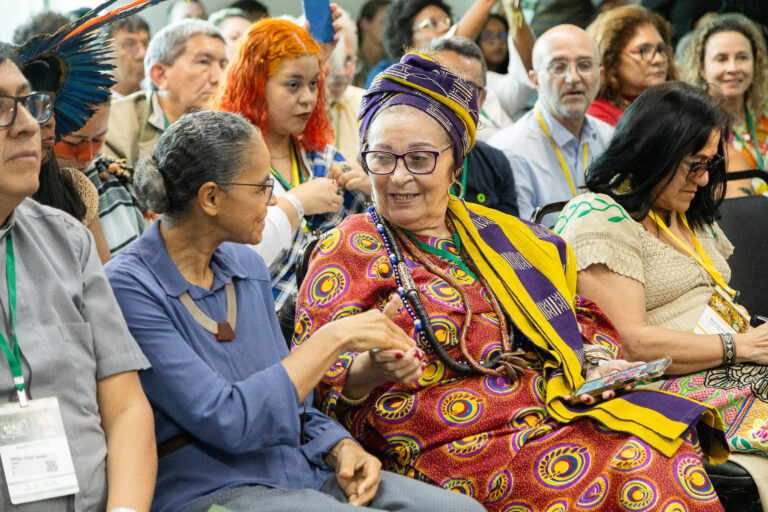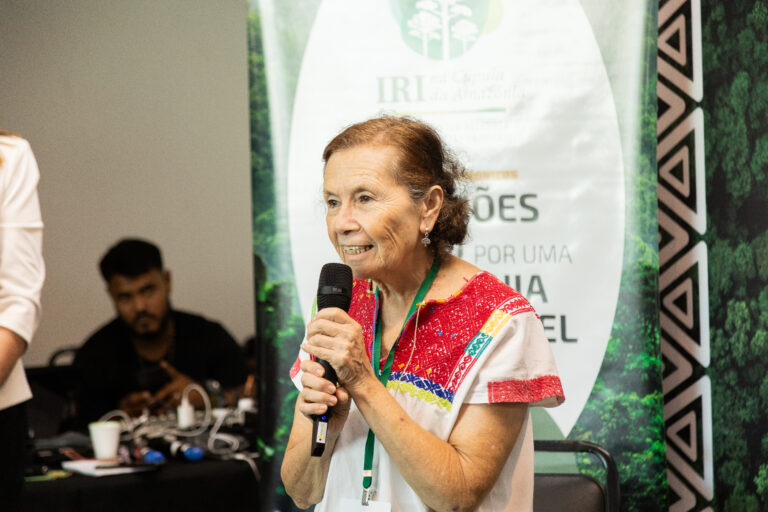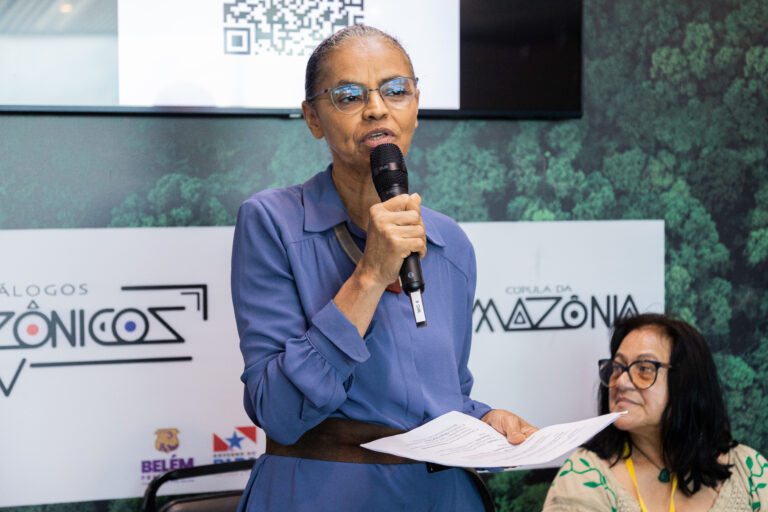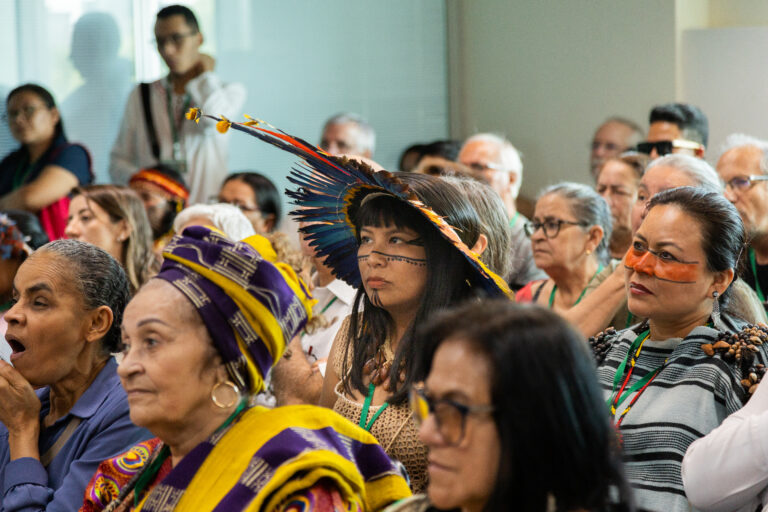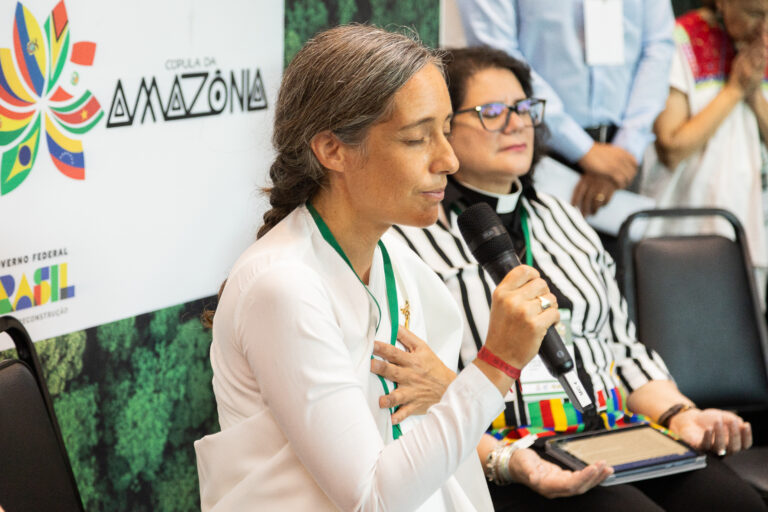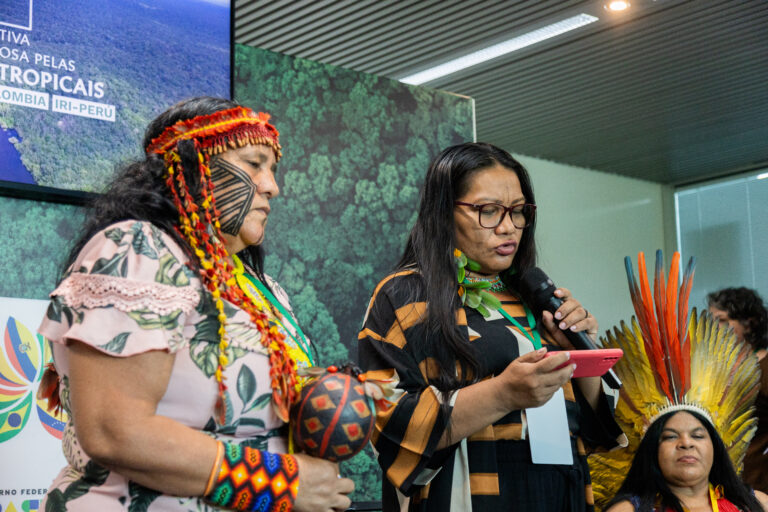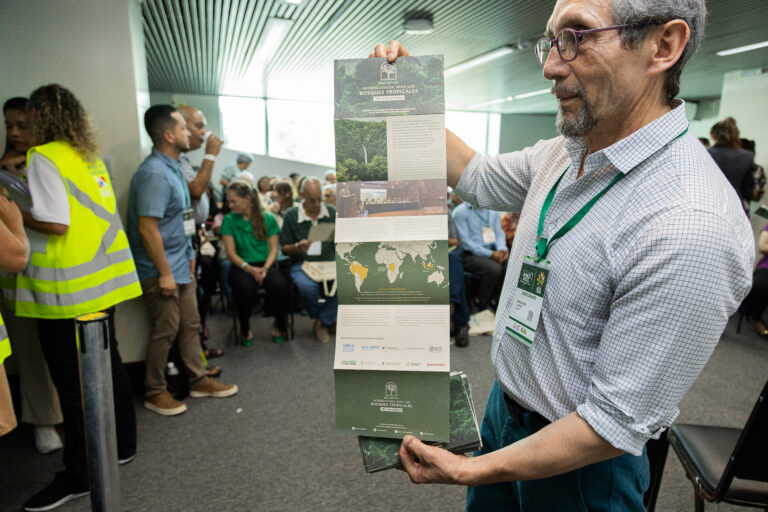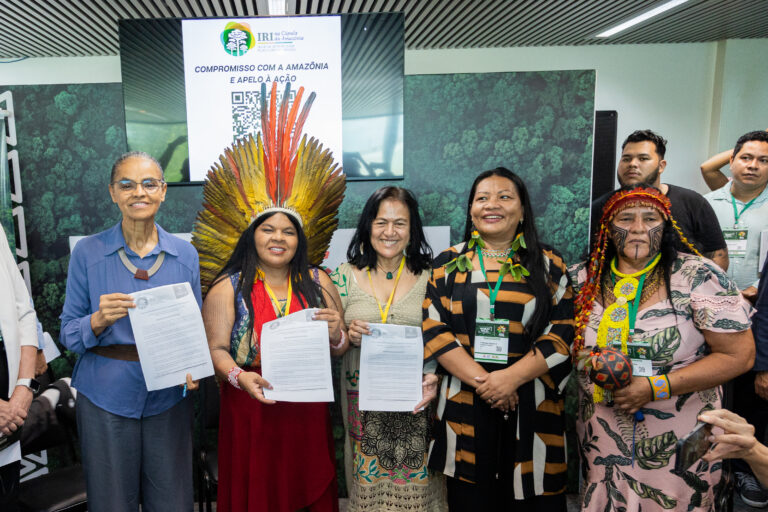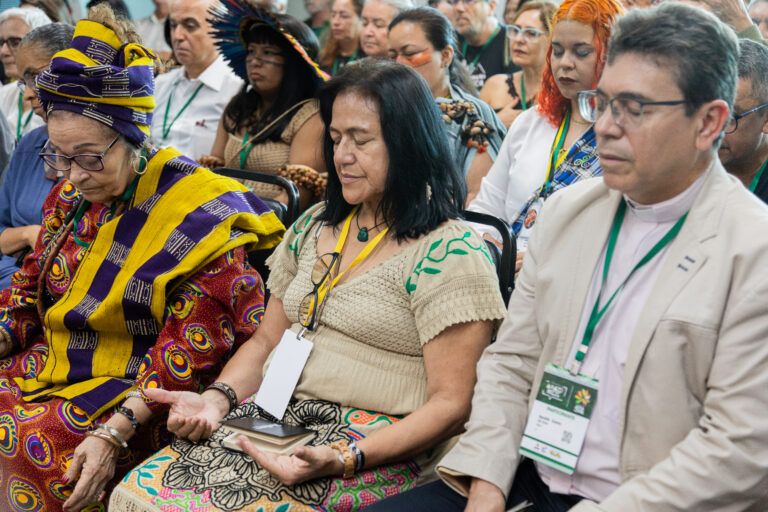The aim of the document is to halt the loss of its biodiversity, the degradation of its soils and water sources and the threats to the rights of indigenous peoples, quilombolas and traditional communities, as well as to provide decent living conditions for these populations.
August 6, 2023
Representatives of the governments of Brazil, Colombia and Peru, religious and indigenous leaders met at the event "Religions in Action for a Sustainable Amazon", which took place as part of the Amazon Dialogues this Sunday (06) at the Hangar-Amazon Convention Center in Belém. The event was organized by the Interfaith Rainforest Initiative (IRI).
At the opening, Reverend Agnaldo Gomes, Director of Religions for Peace Brazil and a member of the IRI Council, mentioned that religions have opened deep wounds in black and indigenous people in the country, "but that, in the name of peace, there is a joint effort to implement IRI in Brazil as a facilitator of a process of integration and harmonious coexistence between religions".
The debates organized by the Interfaith Rainforest Initiative (IRI)which seeks to mobilize communities of all religious traditions and spiritualities, from the grassroots to the leaders, to add their efforts to the great coalition working to protect tropical forests, fight climate change, defend the rights of indigenous peoples, quilombolas and traditional communities and promote the sustainable development of the Amazon, together with governments, indigenous peoples, civil society organizations, companies and UN agencies.
For Carlos Vicente, IRI's National Facilitator, religious leaders can help create a broad popular mobilization in defense of the Amazon and its people. "We want to help strengthen the socio-environmental mobilization that exists in the countries," he said.
IRI's National Facilitator in Peru, Laura Vargas, pointed out that after 500 years of religious presence in Brazil there is a time to rethink actions. "We are defending lives, based on ethical and religious principles, committed to the sustainable development of the forest." He said.
At the panel discussion, Juan Bello, UNEP Director for Latin America and the Caribbean, pointed out that it had taken a long time for a meeting of this nature to take place, so it was a memorable day. "Living in harmony with nature and through spirituality to find a way forward. The Amazon represents a reservoir of spirituality to inhabit this planet, so as long as we have this opportunity, we will continue to accompany you. All of this has to be translated into nature conservation policies. Thinking about a future of unity, wisdom and harmony," he said.
Annette Bull, Norway's Depunty Chief of Mission, pointed out that the country has invested considerable resources in implementing public policies to protect biodiversity and support indigenous peoples over the last 40 years. "I reinforce my country's commitment to a more sustainable future," she added.
The Cardinal of the Amazon, Dom Leonardo Steiner, took part in the event virtually and quoted a phrase from Pope Francis in his speech: "Hands off the Amazon". He emphasized the need to reduce mercury pollution in the rivers and to preserve the fauna and culture of the Amazonian people.
The Interfaith Rainforest Initiative has an Advisory Council made up of religious entities from the most diverse traditions and indigenous organizations in Brazil, Colombia and Peru. One of the highlights of the Dialogues was the presentation of these advisors:
Pastor Romi Bencke, National Secretary of the National Council of Christian Churches in Brazil (CONIC) and IRI Councillor in Brazil, pointed out that it is important to respect the indigenous peoples of the Amazon who have chosen not to have contact. "Sometimes the best way to fulfill the 'go' is to 'stay'. We need to listen more than talk and support zero deforestation initiatives," she said.
Reverend Loida Sardiña, General Secretary of the Interfaith Council of Colombia and Councillor of IRI in Colombia, said that "we need to recognize the responsibility we have with the Amazon".
IRI members recognize that deforestation in the Amazon threatens the existence of local populations and humanity, and that decisive action is therefore essential to halt and reverse this process. For this reason, a document of commitment to the Amazon and a call to action to end deforestation was created. It was delivered to the Minister for Indigenous Peoples, Sônia Guajajara, the Minister for the Environment and Climate Change, Marina Silva, and the Peruvian Minister for the Environment, Albina Ruiz, who were at the event.
Its aim is to halt the loss of its biodiversity, the degradation of its soils and water sources and the threats to the rights of indigenous peoples, quilombolas and traditional communities, as well as to offer decent living conditions to these populations. According to the document, the authorities must adopt comprehensive public policies and sustainable development plans for the Amazon to achieve the following results:
- End deforestation in the Amazon by 2030;
- Strengthen socio-environmental governance;
- Demarcate pending indigenous lands;
- Clear indigenous lands that have already been ratified;
- Destroy the gold mines on indigenous lands;
- Protect isolated indigenous peoples from any attempt at forced contact and respecting prior, free and informed consultation on projects that affect indigenous territories;
- Create priority biodiversity conservation units;
- Allocate vacant land according to socio-environmental criteria;
- Implement a transnational strategy to combat environmental crime and drug trafficking in the Amazon region;
- Adopt efficient payment mechanisms for environmental services for Amazonian communities and landowners who conserve and restore the forest;
- Establish a new standard for planning and executing infrastructure projects in the Amazon that will enable the development of a bioeconomy based on the sustainable use of biodiversity and natural resources;
- Encourage scientific and technological development to enable the establishment of a sustainable forestry economy; and
- Provide access to essential public services (health, education, environmental sanitation, connectivity and public security) of quality for the Amazonian population, seeking to reduce the serious social inequalities and poverty in the region.
The Interfaith Initiative also points out that: "These proposals are the fruit of decades of social mobilization, scientific studies and successful pilot projects and actions in the biome in all our countries."
During the presentation of the document, indigenous leader Cíntia Guajajara sang a song exalting the forest and the God Tupã. "We have this very strong connectivity with mother earth, we bring this energy from the sky," she said at the end.
Para a Ministra Marina Silva, é impossível amar o criador sem respeitar a criação que é a floresta. “Eu li todos os compromissos, são todos compatíveis com o que estamos fazendo com muito trabalho. A gente tá trabalhando duro e já conseguimos reduzir em 42,5% o desmatamento entre janeiro e julho de 2023. Mas nós não queremos diminuir o desmatamento só por ações de força, mas também por ações de desenvolvimento sustentável. É preciso que as leis do coração sobre o cuidado com a natureza prevaleçam, quando a lei está dentro de nós, o cuidado está dentro de nós, o respeito está dentro de nós, aí nem precisa de tantas leis”, disse a Ministra.
Albina Ruiz, Peru's Environment Minister, emphasized her country's commitment to working together with IRI because they do things from the heart. "We have to listen first and then agree or disagree, but we all have to agree on restoration and zero deforestation. We cannot allow drug trafficking to continue, nor human trafficking, nor fauna or flora, much less the destruction of nature," concluded the Peruvian minister.
Sônia Guajajara said she embraced IRI because she understood the importance of the diversity of religions and because it brought a lot of strength to the resistance. "For us, the land is our own body. More than agreements, we need a municipal, state and national agenda for an alternative to the climate crisis. The seed is at the origin and we who are native peoples are also seeds. Never again a Brazil without us," said Sônia.
Blanca Echeverria, IRI's National Facilitator in Colombia, closed the event by highlighting the importance of holding it in a city in the Amazon. "We have achieved our goal of bringing environmental awareness through religions". Blanca said.

